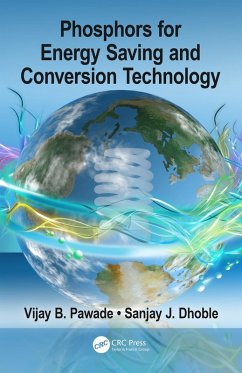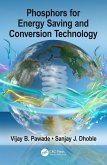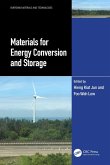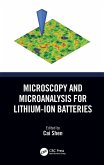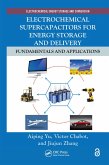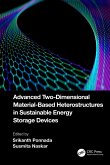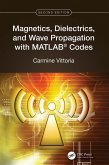54,95 €
54,95 €
inkl. MwSt.
Sofort per Download lieferbar

27 °P sammeln
54,95 €
Als Download kaufen

54,95 €
inkl. MwSt.
Sofort per Download lieferbar

27 °P sammeln
Jetzt verschenken
Alle Infos zum eBook verschenken
54,95 €
inkl. MwSt.
Sofort per Download lieferbar
Alle Infos zum eBook verschenken

27 °P sammeln
- Format: PDF
- Merkliste
- Auf die Merkliste
- Bewerten Bewerten
- Teilen
- Produkt teilen
- Produkterinnerung
- Produkterinnerung

Bitte loggen Sie sich zunächst in Ihr Kundenkonto ein oder registrieren Sie sich bei
bücher.de, um das eBook-Abo tolino select nutzen zu können.
Hier können Sie sich einloggen
Hier können Sie sich einloggen
Sie sind bereits eingeloggt. Klicken Sie auf 2. tolino select Abo, um fortzufahren.

Bitte loggen Sie sich zunächst in Ihr Kundenkonto ein oder registrieren Sie sich bei bücher.de, um das eBook-Abo tolino select nutzen zu können.
This text deals with the advantages of rare earth activated phosphors for the development of solid state lighting technology and in enhancing the light conversion efficiency of Si solar cells. It also includes introduction to phosphor, its working mechanism, role of rare earth ions in the lighting and PV devices, host materials.
- Geräte: PC
- mit Kopierschutz
- eBook Hilfe
- Größe: 10.1MB
Andere Kunden interessierten sich auch für
![Phosphors for Energy Saving and Conversion Technology (eBook, ePUB) Phosphors for Energy Saving and Conversion Technology (eBook, ePUB)]() Vijay B. PawadePhosphors for Energy Saving and Conversion Technology (eBook, ePUB)54,95 €
Vijay B. PawadePhosphors for Energy Saving and Conversion Technology (eBook, ePUB)54,95 €![Materials for Energy Conversion and Storage (eBook, PDF) Materials for Energy Conversion and Storage (eBook, PDF)]() Materials for Energy Conversion and Storage (eBook, PDF)52,95 €
Materials for Energy Conversion and Storage (eBook, PDF)52,95 €![Microscopy and Microanalysis for Lithium-Ion Batteries (eBook, PDF) Microscopy and Microanalysis for Lithium-Ion Batteries (eBook, PDF)]() Microscopy and Microanalysis for Lithium-Ion Batteries (eBook, PDF)60,95 €
Microscopy and Microanalysis for Lithium-Ion Batteries (eBook, PDF)60,95 €![Electrochemical Supercapacitors for Energy Storage and Delivery (eBook, PDF) Electrochemical Supercapacitors for Energy Storage and Delivery (eBook, PDF)]() Aiping YuElectrochemical Supercapacitors for Energy Storage and Delivery (eBook, PDF)0,00 €
Aiping YuElectrochemical Supercapacitors for Energy Storage and Delivery (eBook, PDF)0,00 €![Advanced Two-Dimensional Material-Based Heterostructures in Sustainable Energy Storage Devices (eBook, PDF) Advanced Two-Dimensional Material-Based Heterostructures in Sustainable Energy Storage Devices (eBook, PDF)]() Advanced Two-Dimensional Material-Based Heterostructures in Sustainable Energy Storage Devices (eBook, PDF)52,95 €
Advanced Two-Dimensional Material-Based Heterostructures in Sustainable Energy Storage Devices (eBook, PDF)52,95 €![Magnetics, Dielectrics, and Wave Propagation with MATLAB® Codes (eBook, PDF) Magnetics, Dielectrics, and Wave Propagation with MATLAB® Codes (eBook, PDF)]() Carmine VittoriaMagnetics, Dielectrics, and Wave Propagation with MATLAB® Codes (eBook, PDF)97,95 €
Carmine VittoriaMagnetics, Dielectrics, and Wave Propagation with MATLAB® Codes (eBook, PDF)97,95 €![Room-temperature Sodium-Sulfur Batteries (eBook, PDF) Room-temperature Sodium-Sulfur Batteries (eBook, PDF)]() Room-temperature Sodium-Sulfur Batteries (eBook, PDF)52,95 €
Room-temperature Sodium-Sulfur Batteries (eBook, PDF)52,95 €-
-
-
This text deals with the advantages of rare earth activated phosphors for the development of solid state lighting technology and in enhancing the light conversion efficiency of Si solar cells. It also includes introduction to phosphor, its working mechanism, role of rare earth ions in the lighting and PV devices, host materials.
Dieser Download kann aus rechtlichen Gründen nur mit Rechnungsadresse in A, B, BG, CY, CZ, D, DK, EW, E, FIN, F, GR, HR, H, IRL, I, LT, L, LR, M, NL, PL, P, R, S, SLO, SK ausgeliefert werden.
Produktdetails
- Produktdetails
- Verlag: Taylor & Francis eBooks
- Seitenzahl: 252
- Erscheinungstermin: 3. September 2018
- Englisch
- ISBN-13: 9780429943232
- Artikelnr.: 54172628
- Verlag: Taylor & Francis eBooks
- Seitenzahl: 252
- Erscheinungstermin: 3. September 2018
- Englisch
- ISBN-13: 9780429943232
- Artikelnr.: 54172628
- Herstellerkennzeichnung Die Herstellerinformationen sind derzeit nicht verfügbar.
Dr.Vijay B.Pawade, is an Assistant Professor in Applied-Physics Department, Laxminarayan Institute of Technology, R.T.M. Nagpur University, Nagpur, India. He did M.Sc(Physics) in 2008 (Specialization Condensed matter physics and materials science ) and Ph.D.(Materials Science) in 2012 from Nagpur University. He has seven years of teaching experience in engineering physics and five years of research experience in the study of optical properties of novel rare earth doped oxides based phosphor materials and their application in solid state lighting technology. He has published 27 research papers in refereed international journals and more than 20 papers presented at conferences. Also, he has contributed four book chapters as a co-author on nanomaterials characterization, its engineering applications in energy industries and their future perspective in the development of environmentally friendly energy sources in an edited book published by Elsevier. Now his research focuses on the development of lanthanides based inorganic materials which find potential applications as multifunctional materials for energy saving solid state lighting and energy conversion materials for PV technology. At present, he is the editor of the book entitled "Nanomaterials for Green Energy ¿ published by Elsevier. He is also an reviewer of many international peer reviewd journals published by Elsevier, Willey , Taylor fancies, ACS and RSC.
Dr. Sanjay J. Dhoble, is Professor in Department of Physics, R.T.M. Nagpur University, Nagpur, India. He obtained M.Sc.(Physics) in 1988 from Rani Durgavati University, Jabalpur and a Ph.D. degree in 1992 on Solid State Physics from Nagpur University, Nagpur, India. He has a teaching experience of 27 years and more than 30 years of research experience in the area of luminescence materials and their applications. He has published 570 research papers in international and national journals and file two patents on his credit. Also, he is the author of the two international books published by Elsevier publishing (Principles and Applications of OLEDs) and Phosphate Phosphors for SSL Technology published by Springer. He visited abroad to the in Asian and Europe countries for research and education purpose. He has successfully guided 42 students for a Ph.D. degree. He is a co-author of 23 books/chapters. He is also an editor of the book entitled "Nanomaterials for Green Energy ¿ published by Elsevier and reviewed many international peer reviewd papers published by Elsevier, Willey , Sringer, Taylor fancies, ACS and RSC. Currenlty he is an Editor of Luminescence journal published by Willey.
Dr. Sanjay J. Dhoble, is Professor in Department of Physics, R.T.M. Nagpur University, Nagpur, India. He obtained M.Sc.(Physics) in 1988 from Rani Durgavati University, Jabalpur and a Ph.D. degree in 1992 on Solid State Physics from Nagpur University, Nagpur, India. He has a teaching experience of 27 years and more than 30 years of research experience in the area of luminescence materials and their applications. He has published 570 research papers in international and national journals and file two patents on his credit. Also, he is the author of the two international books published by Elsevier publishing (Principles and Applications of OLEDs) and Phosphate Phosphors for SSL Technology published by Springer. He visited abroad to the in Asian and Europe countries for research and education purpose. He has successfully guided 42 students for a Ph.D. degree. He is a co-author of 23 books/chapters. He is also an editor of the book entitled "Nanomaterials for Green Energy ¿ published by Elsevier and reviewed many international peer reviewd papers published by Elsevier, Willey , Sringer, Taylor fancies, ACS and RSC. Currenlty he is an Editor of Luminescence journal published by Willey.
Part 1: Fundamentals of Atoms and Semiconductor. 1. Short Review on Atomic
and Semiconductor Theory. Part 2: Phosphor- An Overview. 2. Introduction to
"Phosphors, Rare Earths, Properties and Applications. 3. Synthesis &
Characterization of Phosphor. Part 3: Scope of Phosphor. 4. Phosphor for
Light Emitting Diode. 5. Phosphor for PV Technology. Part 4: Efficient and
Eco-Friendly Technology. 6. Cell Response and Other Solar Cell Materials.
7. Phosphor for Environment Friendly Technology.
and Semiconductor Theory. Part 2: Phosphor- An Overview. 2. Introduction to
"Phosphors, Rare Earths, Properties and Applications. 3. Synthesis &
Characterization of Phosphor. Part 3: Scope of Phosphor. 4. Phosphor for
Light Emitting Diode. 5. Phosphor for PV Technology. Part 4: Efficient and
Eco-Friendly Technology. 6. Cell Response and Other Solar Cell Materials.
7. Phosphor for Environment Friendly Technology.
Part 1: Fundamentals of Atoms and Semiconductor. 1. Short Review on Atomic
and Semiconductor Theory. Part 2: Phosphor- An Overview. 2. Introduction to
"Phosphors, Rare Earths, Properties and Applications. 3. Synthesis &
Characterization of Phosphor. Part 3: Scope of Phosphor. 4. Phosphor for
Light Emitting Diode. 5. Phosphor for PV Technology. Part 4: Efficient and
Eco-Friendly Technology. 6. Cell Response and Other Solar Cell Materials.
7. Phosphor for Environment Friendly Technology.
and Semiconductor Theory. Part 2: Phosphor- An Overview. 2. Introduction to
"Phosphors, Rare Earths, Properties and Applications. 3. Synthesis &
Characterization of Phosphor. Part 3: Scope of Phosphor. 4. Phosphor for
Light Emitting Diode. 5. Phosphor for PV Technology. Part 4: Efficient and
Eco-Friendly Technology. 6. Cell Response and Other Solar Cell Materials.
7. Phosphor for Environment Friendly Technology.
